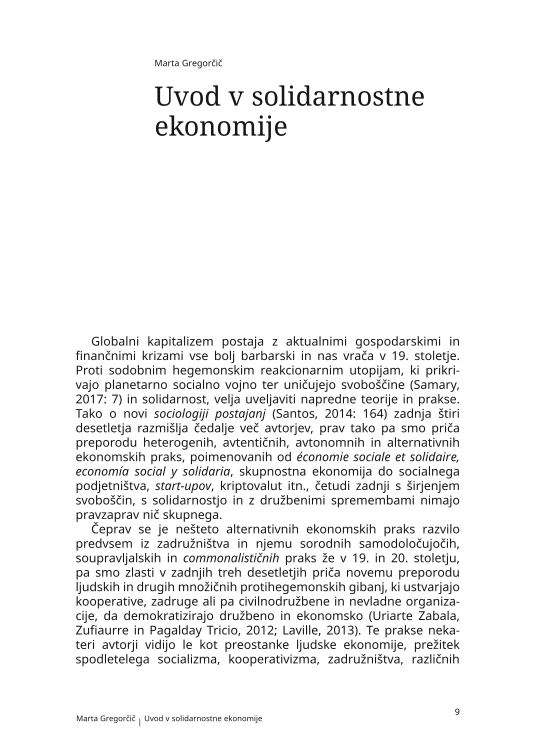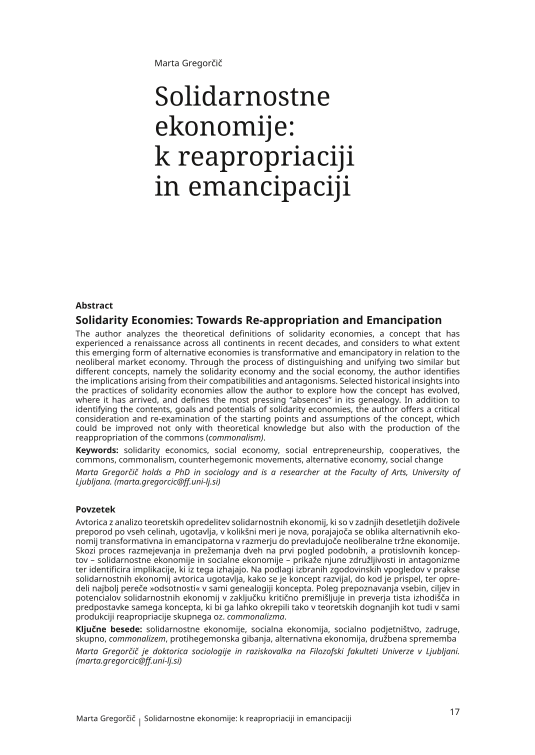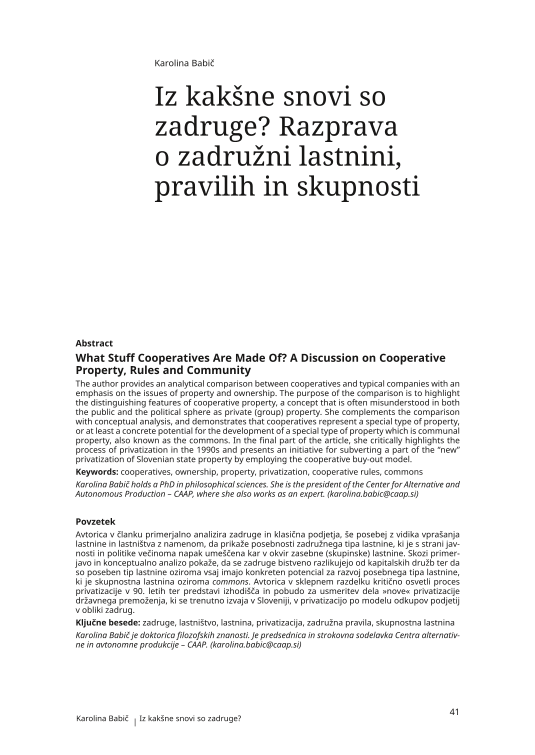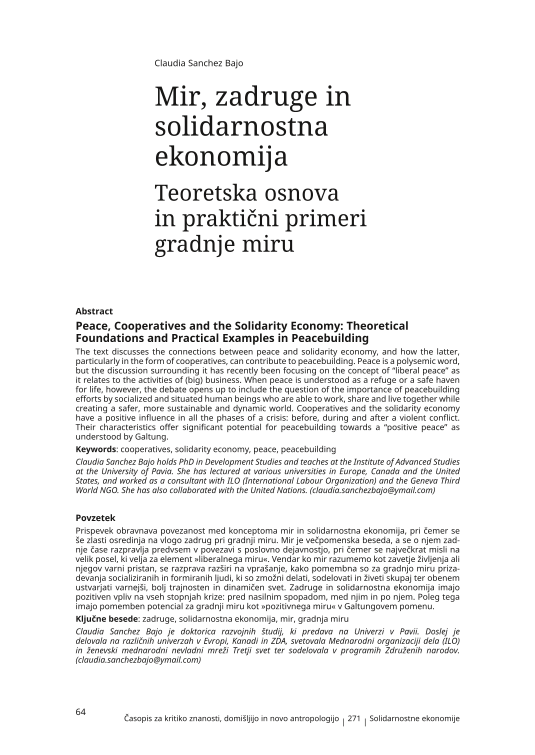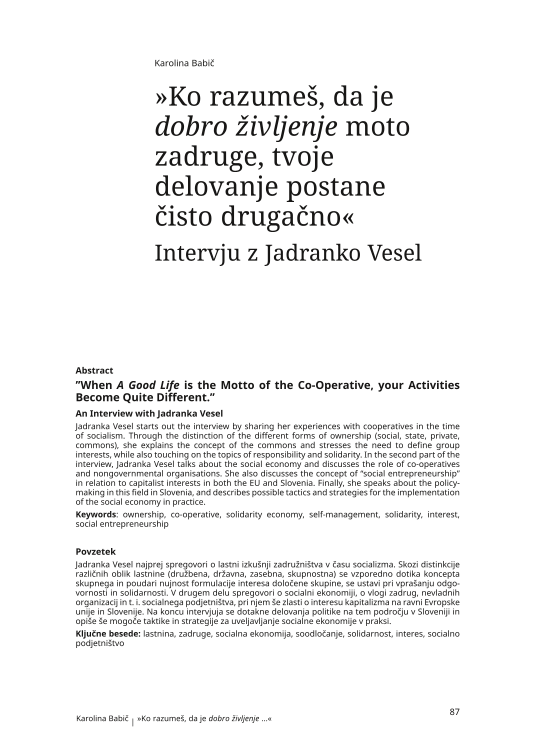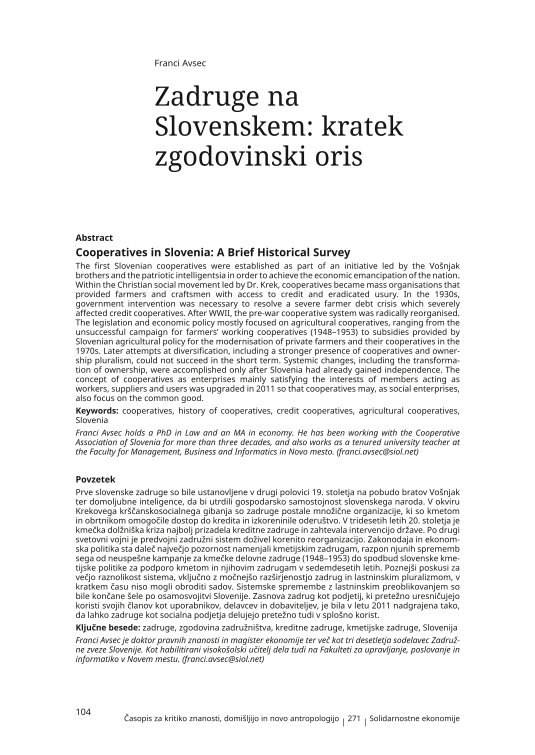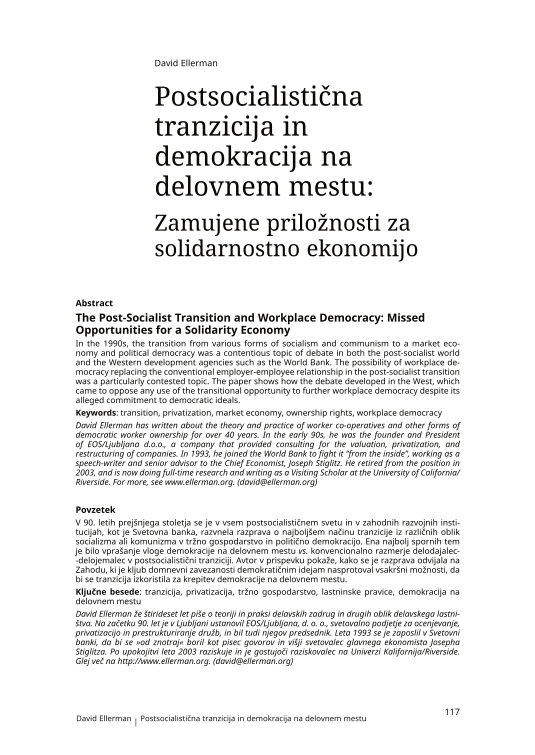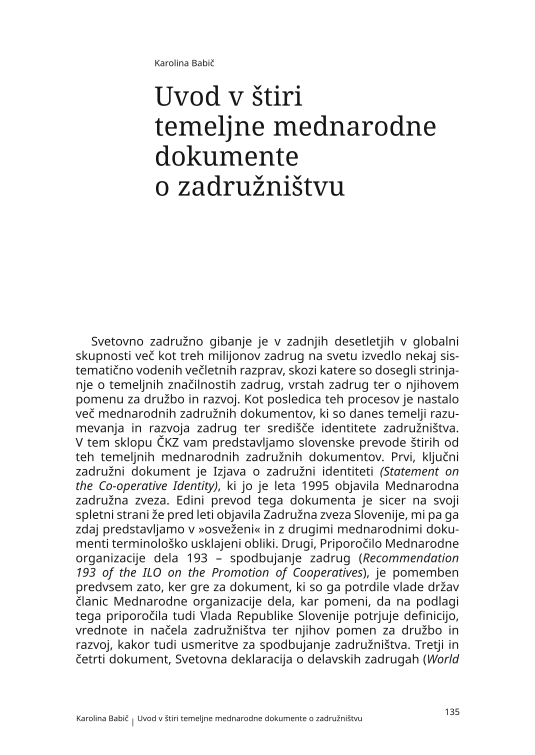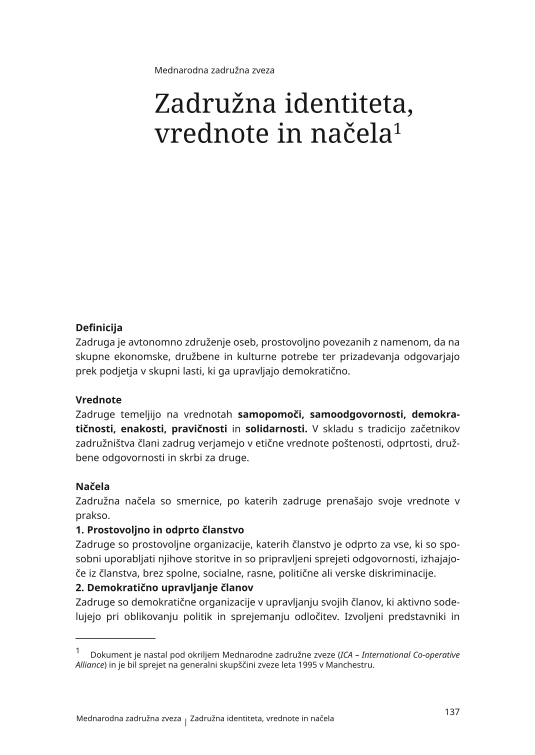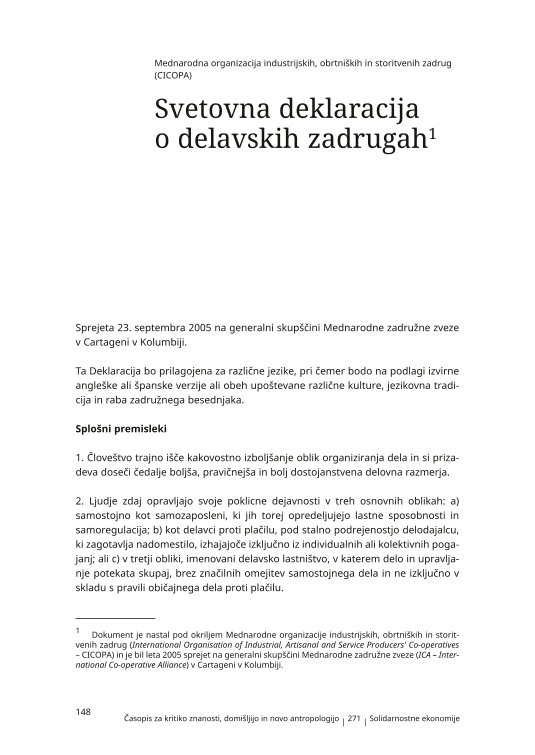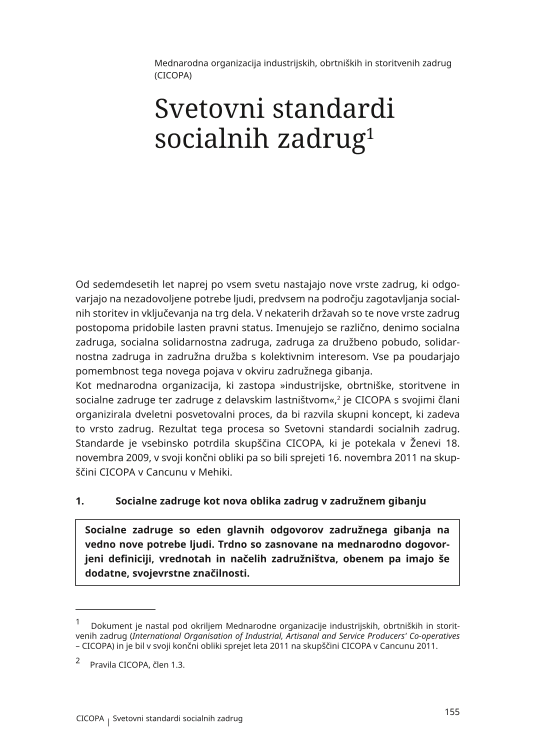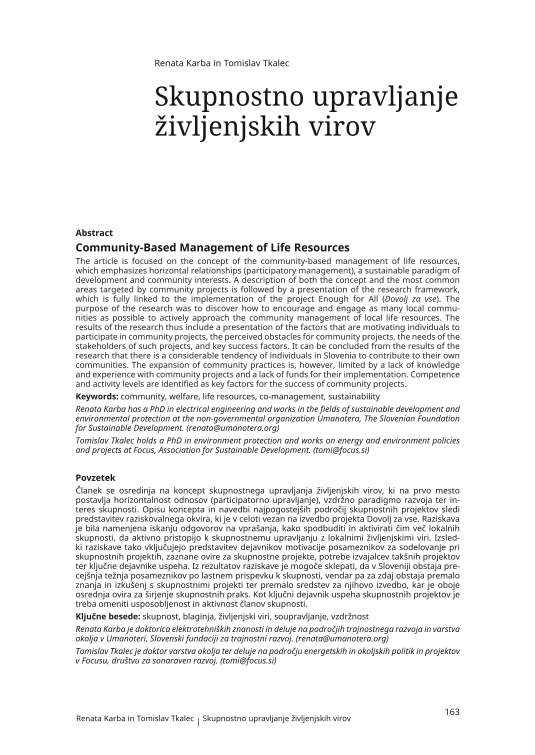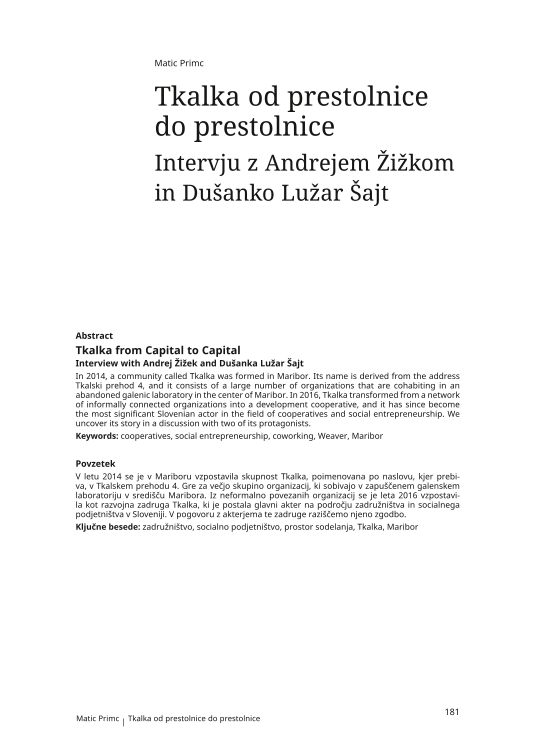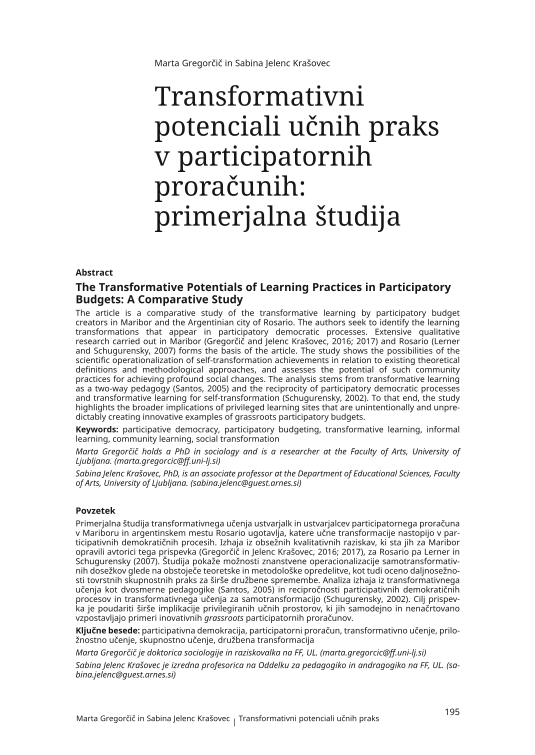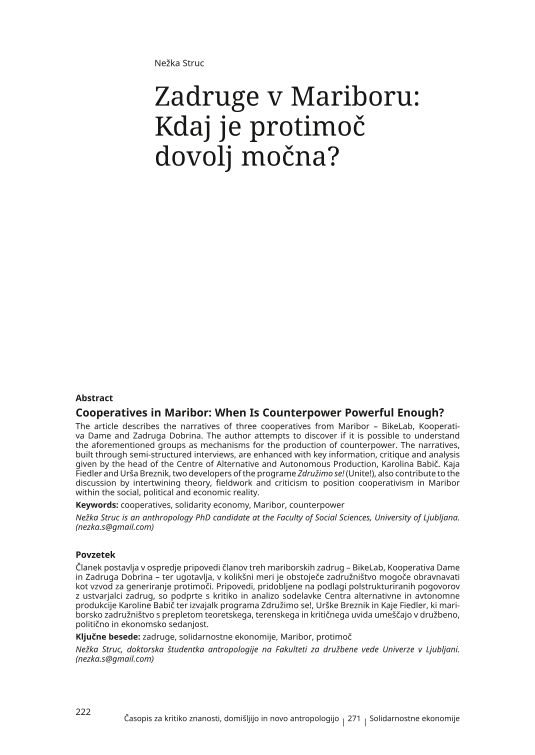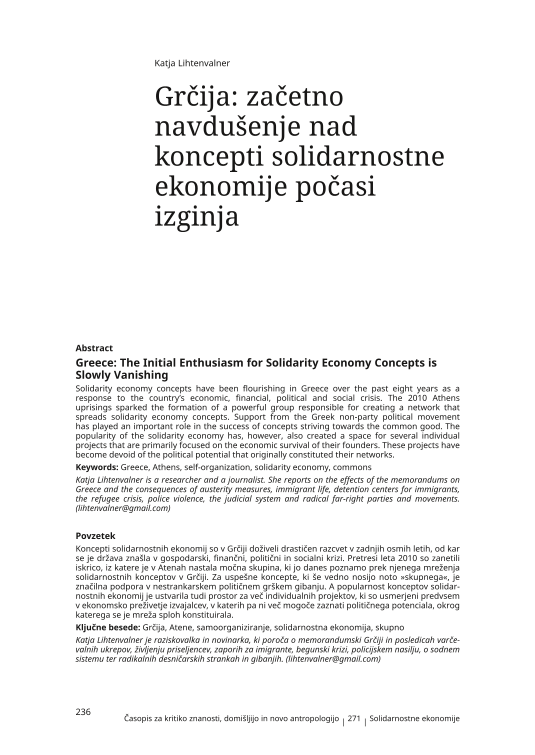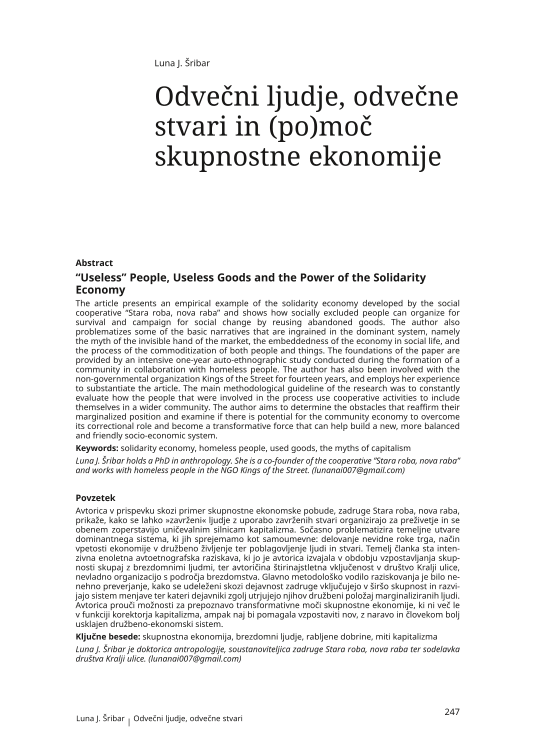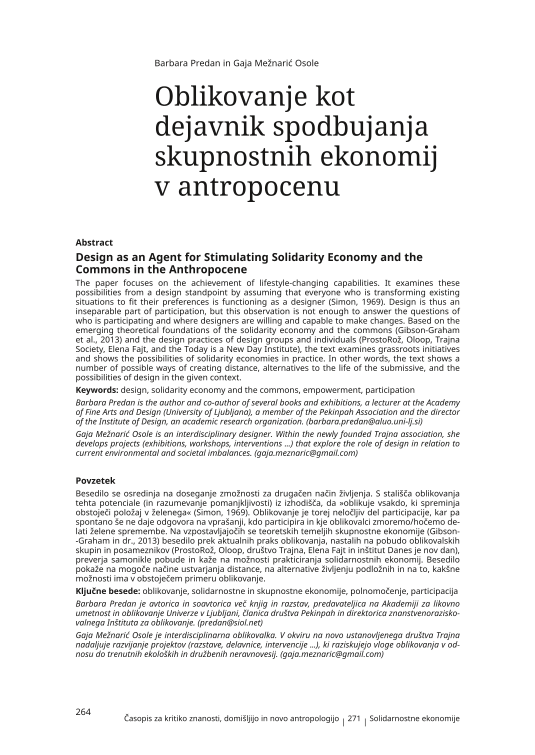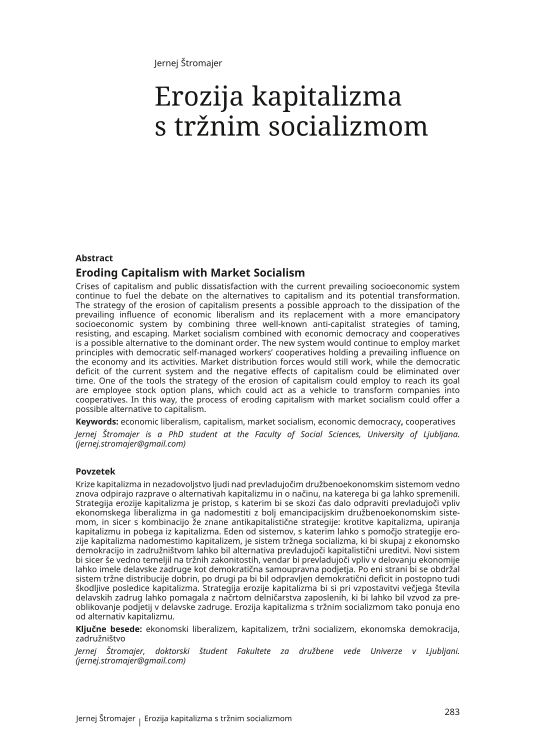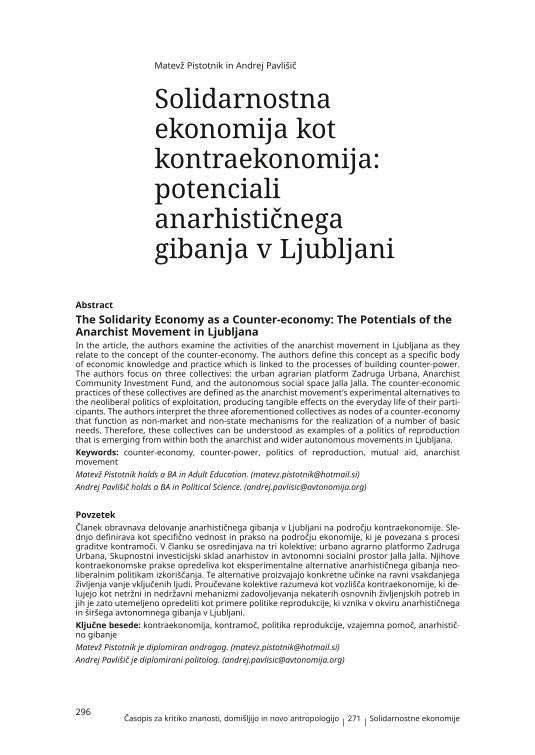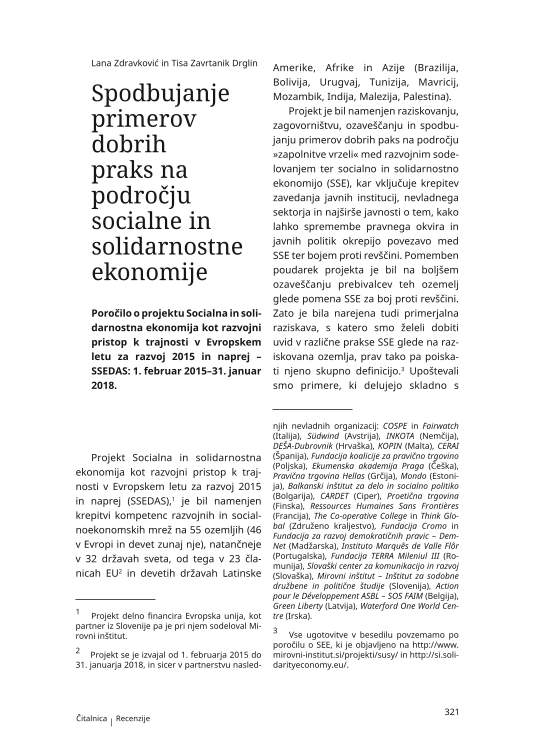Globalni kapitalizem postaja z aktualnimi gospodarskimi in finančnimi krizami vse bolj barbarski in nas vrača v 19. stoletje. Proti sodobnim hegemonskim reakcionarnim utopijam, ki prikrivajo planetarno socialno vojno ter uničujejo svoboščine (Samary, 2017: 7) in solidarnost, velja uveljaviti napredne teorije in prakse. Tako o novi sociologiji postajanj (Santos, 2014: 164) zadnja štiri desetletja razmišlja čedalje več avtorjev, prav tako pa smo priča preporodu heterogenih, avtentičnih, avtonomnih in alternativnih ekonomskih praks, poimenovanih od économie sociale et solidaire, economía social y solidaria, skupnostna ekonomija do socialnega podjetništva, start-upov, kriptovalut itn., četudi zadnji s širjenjem svoboščin, s solidarnostjo in z družbenimi spremembami nimajo pravzaprav nič skupnega.
The author analyzes the theoretical definitions of solidarity economies, a concept that has experienced a renaissance across all continents in recent decades, and considers to what extent this emerging form of alternative economies is transformative and emancipatory in relation to the neoliberal market economy. Through the process of distinguishing and unifying two similar but different concepts, namely the solidarity economy and the social economy, the author identifies the implications arising from their compatibilities and antagonisms. Selected historical insights into the practices of solidarity economies allow the author to explore how the concept has evolved, where it has arrived, and defines the most pressing “absences” in its genealogy. In addition to identifying the contents, goals and potentials of solidarity economies, the author offers a critical consideration and re-examination of the starting points and assumptions of the concept, which could be improved not only with theoretical knowledge but also with the production of the reappropriation of the commons (commonalism).
What Stuff Cooperatives Are Made Of? A Discussion on Cooperative Property, Rules and Community
(
The author provides an analytical comparison between cooperatives and typical companies with an emphasis on the issues of property and ownership. The purpose of the comparison is to highlight the distinguishing features of cooperative property, a concept that is often misunderstood in both the public and the political sphere as private (group) property. She complements the comparison with conceptual analysis, and demonstrates that cooperatives represent a special type of property, or at least a concrete potential for the development of a special type of property which is communal property, also known as the commons. In the final part of the article, she critically highlights the process of privatization in the 1990s and presents an initiative for subverting a part of the “new” privatization of Slovenian state property by employing the cooperative buy-out model.
The text discusses the connections between peace and solidarity economy, and how the latter, particularly in the form of cooperatives, can contribute to peacebuilding. Peace is a polysemic word, but the discussion surrounding it has recently been focusing on the concept of “liberal peace” as it relates to the activities of (big) business. When peace is understood as a refuge or a safe haven for life, however, the debate opens up to include the question of the importance of peacebuilding efforts by socialized and situated human beings who are able to work, share and live together while creating a safer, more sustainable and dynamic world. Cooperatives and the solidarity economy have a positive influence in all the phases of a crisis: before, during and after a violent conflict. Their characteristics offer significant potential for peacebuilding towards a “positive peace” as understood by Galtung.
Jadranka Vesel starts out the interview by sharing her experiences with cooperatives in the time of socialism. Through the distinction of the different forms of ownership (social, state, private, commons), she explains the concept of the commons and stresses the need to define group interests, while also touching on the topics of responsibility and solidarity. In the second part of the interview, Jadranka Vesel talks about the social economy and discusses the role of co-operatives and nongovernmental organisations. She also discusses the concept of “social entrepreneurship” in relation to capitalist interests in both the EU and Slovenia. Finally, she speaks about the policy-making in this field in Slovenia, and describes possible tactics and strategies for the implementation of the social economy in practice.
The first Slovenian cooperatives were established as part of an initiative led by the Vošnjak brothers and the patriotic intelligentsia in order to achieve the economic emancipation of the nation. Within the Christian social movement led by Dr. Krek, cooperatives became mass organisations that provided farmers and craftsmen with access to credit and eradicated usury. In the 1930s, government intervention was necessary to resolve a severe farmer debt crisis which severely affected credit cooperatives. After WWII, the pre-war cooperative system was radically reorganised. The legislation and economic policy mostly focused on agricultural cooperatives, ranging from the unsuccessful campaign for farmers’ working cooperatives (1948–1953) to subsidies provided by Slovenian agricultural policy for the modernisation of private farmers and their cooperatives in the 1970s. Later attempts at diversification, including a stronger presence of cooperatives and ownership pluralism, could not succeed in the short term. Systemic changes, including the transformation of ownership, were accomplished only after Slovenia had already gained independence. The concept of cooperatives as enterprises mainly satisfying the interests of members acting as workers, suppliers and users was upgraded in 2011 so that cooperatives may, as social enterprises, also focus on the common good.
The Post-Socialist Transition and Workplace Democracy: Missed Opportunities for a Solidarity Economy
(
In the 1990s, the transition from various forms of socialism and communism to a market economy and political democracy was a contentious topic of debate in both the post-socialist world and the Western development agencies such as the World Bank. The possibility of workplace democracy replacing the conventional employer-employee relationship in the post-socialist transition was a particularly contested topic. The paper shows how the debate developed in the West, which came to oppose any use of the transitional opportunity to further workplace democracy despite its alleged commitment to democratic ideals.
Svetovno zadružno gibanje je v zadnjih desetletjih v globalni skupnosti več kot treh milijonov zadrug na svetu izvedlo nekaj sistematično vodenih večletnih razprav, skozi katere so dosegli strinjanje o temeljnih značilnostih zadrug, vrstah zadrug ter o njihovem pomenu za družbo in razvoj. Kot posledica teh procesov je nastalo več mednarodnih zadružnih dokumentov, ki so danes temelji razumevanja in razvoja zadrug ter središče identitete zadružništva. V tem sklopu ČKZ vam predstavljamo slovenske prevode štirih od teh temeljnih mednarodnih zadružnih dokumentov. Prvi, ključni zadružni dokument je Izjava o zadružni identiteti (Statement on the Co-operative Identity), ki jo je leta 1995 objavila Mednarodna zadružna zveza. Edini prevod tega dokumenta je sicer na svoji spletni strani že pred leti objavila Zadružna zveza Slovenije, mi pa ga zdaj predstavljamo v »osveženi« in z drugimi mednarodnimi dokumenti terminološko usklajeni obliki. Drugi, Priporočilo Mednarodne organizacije dela 193 – spodbujanje zadrug (Recommendation 193 of the ILO on the Promotion of Cooperatives), je pomemben predvsem zato, ker gre za dokument, ki so ga potrdile vlade držav članic Mednarodne organizacije dela, kar pomeni, da na podlagi tega priporočila tudi Vlada Republike Slovenije potrjuje definicijo, vrednote in načela zadružništva ter njihov pomen za družbo in razvoj, kakor tudi usmeritve za spodbujanje zadružništva. Tretji in četrti dokument, Svetovna deklaracija o delavskih zadrugah (World Declaration on Worker Cooperatives) in Svetovni standardi socialnih zadrug (World Social Cooperative Standards), pa sta za nas pomembna predvsem zato, ker se trenutno prav na področjih, ki jih usmerjata ta dva dokumenta, v Sloveniji najbolj intenzivno razvijajo nove zadruge.
Zadruga je avtonomno združenje oseb, prostovoljno povezanih z namenom, da na skupne ekonomske, družbene in kulturne potrebe ter prizadevanja odgovarjajo prek podjetja v skupni lasti, ki ga upravljajo demokratično.
Generalna konferenca Mednarodne organizacije dela, ki jo je v Ženevi sklical upravni organ Mednarodnega urada za delo – ta se je sestal na svojem 90. zasedanju 3. junija 2002 –, je ob upoštevanju pomena zadrug pri ustvarjanju delovnih mest, mobiliziranju virov, ustvarjanju naložb in njihovem prispevku h gospodarstvu, ob upoštevanju dejstva, da zadruge v različnih oblikah spodbujajo čim večjo udeležbo vseh ljudi v gospodarskem in družbenem razvoju, ob upoštevanju dejstva, da je globalizacija povzročila nove in različne pritiske, težave, izzive in odprla priložnosti za zadruge ter opozorila, da potrebujemo močnejše oblike človeške solidarnosti na nacionalni in mednarodni ravni, če želimo zagotoviti pravično porazdelitev koristi globalizacije, in ob upoštevanju Deklaracije o temeljnih načelih in pravicah pri delu Mednarodne organizacije dela, ki jih je sprejela Mednarodna konferenca dela na svojem 86. zasedanju (1998), in ob upoštevanju pravic in načel, ki jih vsebujejo mednarodne konvencije in priporočila o delu, zlasti Konvencija o prisilnem ali obveznem delu (1930), Konvencija o sindikalni svobodi in varstvu sindikalnih pravic (1948), Konvencija o uporabi načel o pravicah organiziranja in kolektivnega dogovarjanja (1949), Konvencija o enakem plačilu (1951), Konvencija o socialni varnosti (minimalni standardi) (1952), Konvencija o odpravi prisilnega dela (1957), Konvencija o diskriminaciji pri zaposlovanju in poklicih (1958), Konvencija o politiki zaposlovanja (1964), Konvencija o minimalni starosti (1973), Konvencija in Priporočilo o organizacijah podeželskih delavcev (1975), Konvencija in Priporočilo o razvoju človeških virov (1975), Priporočilo o politiki zaposlovanja (dopolnilne določbe) (1984), Priporočilo o ustvarjanju delovnih mest v malih in srednje velikih podjetjih (1998) in Konvencija o najhujših oblikah otroškega dela (1999), ob sklicevanju na načelo iz Filadelfijske deklaracije, da »delo ni blago«, ob poudarjanju, da je uresničevanje dostojnega dela za delavce po vsem svetu glavni cilj Mednarodne organizacije dela, po odločitvi za sprejetje nekaterih predlogov v zvezi s spodbujanjem zadrug, kar je četrta točka dnevnega reda zasedanja, po ugotovitvi, da so ti predlogi v obliki priporočila, dvajsetega junija 2002 sprejela naslednje priporočilo, ki se lahko navaja kot Priporočilo o spodbujanju zadrug (2002).
Sprejeta 23. septembra 2005 na generalni skupščini Mednarodne zadružne zveze v Cartageni v Kolumbiji.
Ta Deklaracija bo prilagojena za različne jezike, pri čemer bodo na podlagi izvirne angleške ali španske verzije ali obeh upoštevane različne kulture, jezikovna tradicija in raba zadružnega besednjaka.
Od sedemdesetih let naprej po vsem svetu nastajajo nove vrste zadrug, ki odgovarjajo na nezadovoljene potrebe ljudi, predvsem na področju zagotavljanja socialnih storitev in vključevanja na trg dela. V nekaterih državah so te nove vrste zadrug postopoma pridobile lasten pravni status. Imenujejo se različno, denimo socialna zadruga, socialna solidarnostna zadruga, zadruga za družbeno pobudo, solidarnostna zadruga in zadružna družba s kolektivnim interesom. Vse pa poudarjajo pomembnost tega novega pojava v okviru zadružnega gibanja.
Kot mednarodna organizacija, ki zastopa »industrijske, obrtniške, storitvene in socialne zadruge ter zadruge z delavskim lastništvom«, je CICOPA s svojimi člani organizirala dveletni posvetovalni proces, da bi razvila skupni koncept, ki zadeva to vrsto zadrug. Rezultat tega procesa so Svetovni standardi socialnih zadrug. Standarde je vsebinsko potrdila skupščina CICOPA, ki je potekala v Ženevi 18. novembra 2009, v svoji končni obliki pa so bili sprejeti 16. novembra 2011 na skupščini CICOPA v Cancunu v Mehiki.
The article is focused on the concept of the community-based management of life resources, which emphasizes horizontal relationships (participatory management), a sustainable paradigm of development and community interests. A description of both the concept and the most common areas targeted by community projects is followed by a presentation of the research framework, which is fully linked to the implementation of the project Enough for All (Dovolj za vse). The purpose of the research was to discover how to encourage and engage as many local communities as possible to actively approach the community management of local life resources. The results of the research thus include a presentation of the factors that are motivating individuals to participate in community projects, the perceived obstacles for community projects, the needs of the stakeholders of such projects, and key success factors. It can be concluded from the results of the research that there is a considerable tendency of individuals in Slovenia to contribute to their own communities. The expansion of community practices is, however, limited by a lack of knowledge and experience with community projects and a lack of funds for their implementation. Competence and activity levels are identified as key factors for the success of community projects.
In 2014, a community called Tkalka was formed in Maribor. Its name is derived from the address Tkalski prehod 4, and it consists of a large number of organizations that are cohabiting in an abandoned galenic laboratory in the center of Maribor. In 2016, Tkalka transformed from a network of informally connected organizations into a development cooperative, and it has since become the most significant Slovenian actor in the field of cooperatives and social entrepreneurship. We uncover its story in a discussion with two of its protagonists.
The Transformative Potentials of Learning Practices in Participatory Budgets: A Comparative Study
(
The article is a comparative study of the transformative learning by participatory budget creators in Maribor and the Argentinian city of Rosario. The authors seek to identify the learning transformations that appear in participatory democratic processes. Extensive qualitative research carried out in Maribor (Gregorčič and Jelenc Krašovec, 2016; 2017) and Rosario (Lerner and Schugurensky, 2007) forms the basis of the article. The study showsthe possibilities of the scientific operationalization of self-transformation achievements in relation to existing theoretical definitions and methodological approaches, and assesses the potential of such community practices for achieving profound social changes. The analysis stems from transformative learning as a two-way pedagogy (Santos, 2005) and the reciprocity of participatory democratic processes and transformative learning for self-transformation (Schugurensky, 2002). To that end, the study highlights the broader implications of privileged learning sites that are unintentionally and unpredictably creating innovative examples of grassroots participatory budgets.
The article describes the narratives of three cooperatives from Maribor – BikeLab, Kooperativa Dame and Zadruga Dobrina. The author attempts to discover if it is possible to understand the aforementioned groups as mechanisms for the production of counterpower. The narratives, built through semi-structured interviews, are enhanced with key information, critique and analysis given by the head of the Centre of Alternative and Autonomous Production, Karolina Babič. Kaja Fiedler and Urša Breznik, two developers of the programe Združimo se! (Unite!), also contribute to the discussion by intertwining theory, fieldwork and criticism to position cooperativism in Maribor within the social, political and economic reality.
Solidarity economy concepts have been flourishing in Greece over the past eight years as a response to the country’s economic, financial, political and social crisis. The 2010 Athens uprisings sparked the formation of a powerful group responsible for creating a network that spreads solidarity economy concepts. Support from the Greek non-party political movement has played an important role in the success of concepts striving towards the common good. The popularity of the solidarity economy has, however, also created a space for several individual projects that are primarily focused on the economic survival of their founders. These projects have become devoid of the political potential that originally constituted their networks.
The article presents an empirical example of the solidarity economy developed by the social cooperative “Stara roba, nova raba” and shows how socially excluded people can organize for survival and campaign for social change by reusing abandoned goods. The author also problematizes some of the basic narratives that are ingrained in the dominant system, namely the myth of the invisible hand of the market, the embeddedness of the economy in social life, and the process of the commoditization of both people and things. The foundations of the paper are provided by an intensive one-year auto-ethnographic study conducted during the formation of a community in collaboration with homeless people. The author has also been involved with the non-governmental organization Kings of the Street for fourteen years, and employs her experience to substantiate the article. The main methodological guideline of the research was to constantly evaluate how the people that were involved in the process use cooperative activities to include themselves in a wider community. The author aims to determine the obstacles that reaffirm their marginalized position and examine if there is potential for the community economy to overcome its correctional role and become a transformative force that can help build a new, more balanced and friendly socio-economic system.
Design as an Agent for Stimulating Solidarity Economy and the Commons in the Anthropocene
(
The paper focuses on the achievement of lifestyle-changing capabilities. It examines these possibilities from a design standpoint by assuming that everyone who is transforming existing situations to fit their preferences is functioning as a designer (Simon, 1969). Design is thus an inseparable part of participation, but this observation is not enough to answer the questions of who is participating and where designers are willing and capable to make changes. Based on the emerging theoretical foundations of the solidarity economy and the commons (Gibson-Graham et al., 2013) and the design practices of design groups and individuals (ProstoRož, Oloop, Trajna Society, Elena Fajt, and the Today is a New Day Institute), the text examines grassroots initiatives and shows the possibilities of solidarity economies in practice. In other words, the text shows a number of possible ways of creating distance, alternatives to the life of the submissive, and the possibilities of design in the given context.
Crises of capitalism and public dissatisfaction with the current prevailing socioeconomic system continue to fuel the debate on the alternatives to capitalism and its potential transformation. The strategy of the erosion of capitalism presents a possible approach to the dissipation of the prevailing influence of economic liberalism and its replacement with a more emancipatory socioeconomic system by combining three well-known anti-capitalist strategies of taming, resisting, and escaping. Market socialism combined with economic democracy and cooperatives is a possible alternative to the dominant order. The new system would continue to employ market principles with democratic self-managed workers’ cooperatives holding a prevailing influence on the economy and its activities. Market distribution forces would still work, while the democratic deficit of the current system and the negative effects of capitalism could be eliminated over time. One of the tools the strategy of the erosion of capitalism could employ to reach its goal are employee stock option plans, which could act as a vehicle to transform companies into cooperatives. In this way, the process of eroding capitalism with market socialism could offer a possible alternative to capitalism.
The Solidarity Economy as a Counter-economy: The Potentials of the Anarchist Movement in Ljubljana
(
In the article, the authors examine the activities of the anarchist movement in Ljubljana as they relate to the concept of the counter-economy. The authors define this concept as a specific body of economic knowledge and practice which is linked to the processes of building counter-power. The authors focus on three collectives: the urban agrarian platform Zadruga Urbana, Anarchist Community Investment Fund, and the autonomous social space Jalla Jalla. The counter-economic practices of these collectives are defined as the anarchist movement's experimental alternatives to the neoliberal politics of exploitation, producing tangible effects on the everyday life of their participants. The authors interpret the three aforementioned collectives as nodes of a counter-economy that function as non-market and non-state mechanisms for the realization of a number of basic needs. Therefore, these collectives can be understood as examples of a politics of reproduction that is emerging from within both the anarchist and wider autonomous movements in Ljubljana.
Poročilo o projektu Socialna in solidarnostna ekonomija kot razvojni pristop k trajnosti v Evropskem letu za razvoj 2015 in naprej – SSEDAS: 1. februar 2015–31. januar 2018.
Projekt Socialna in solidarnostna ekonomija kot razvojni pristop k trajnosti v Evropskem letu za razvoj 2015 in naprej (SSEDAS),1 je bil namenjen krepitvi kompetenc razvojnih in socialnoekonomskih mrež na 55 ozemljih (46 v Evropi in devet zunaj nje), natančneje v 32 državah sveta, od tega v 23 članicah EU2 in devetih državah Latinske Amerike, Afrike in Azije (Brazilija, Bolivija, Urugvaj, Tunizija, Mavricij, Mozambik, Indija, Malezija, Palestina).




